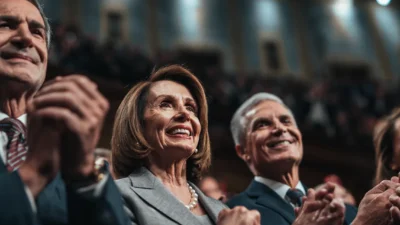TLDR
- Republican Senator Tim Scott recently introduced the Financial Integrity and Regulation Management Act, designed to directly tackle debanking by removing “reputational risk” from the regulatory equation.
- Meanwhile, the OCC has clarified its stance on crypto services and banking services to crypto companies.
Last week, we reported on a talk given by Caitlin Long at ETHDenver, where she stated, and was right, that nothing has been done about debanking since the President’s initial executive order.
Dear Caitlin. Ask and you shall receive. A new bill has been unveiled in Washington that is set to tackle the issue.
On the other side of the regulatory table, the Office of the Comptroller of the Currency (OCC) has made some clarifications about offering crypto services and banking services to crypto companies. Here’s what you need to know about the debanking crisis, the recent regulatory moves, and why this issue might become a pivotal moment for the future of cryptocurrency.
What Is Debanking, and Why Should You Care?
Debanking refers to the act of banks closing accounts (or outright refusing services) they deem “risky,” often without warning or detailed explanation.
While banks have historically cut ties with entities they perceive as high risk (think gambling websites, cannabis businesses, or fringe financial services such as payday loans), the term “debanking” is now being more often associated with individuals and companies involved in cryptocurrency.
Critics argue that this practice is less about risk and more about targeting innovation, freedom, and entirely legal industries. You’ll want to pay close attention if you’re into blockchain or crypto platforms. The practice is commonly known as “Operation Choke Point 2.0,” and the TLDR is that it’s a subtle way for regulators and banks to squeeze out businesses they don’t want to deal with.
For crypto enthusiasts, this isn’t just a minor inconvenience. It’s about access to financial systems that enable innovation and participation in a decentralized economic future.
The OCC Pushes Back on Crypto Restrictions
The Office of the Comptroller of the Currency (OCC) has taken action to clarify that certain crypto activities are, in fact, permissible for national banks and federal savings associations.
The OCC’s newly released Interpretive Letter 1183 confirms that banks can legally offer services like crypto-asset custody, stablecoin-related activities, and participation in independent node verification networks (read: blockchain systems). This clears the fog around whether banks can incorporate crypto activities into their traditional services.
But there’s more. The OCC has also removed a cumbersome requirement for banks to get prior “supervisory nonobjection” before engaging in crypto operations. It simplifies the process and eliminates red tape, potentially giving banks the green light to explore crypto services without jumping through endless loopholes.
According to Acting Comptroller of the Currency Rodney E. Hood, “Today’s action will reduce the burden on banks to engage in crypto-related activities.”
For users, this could mean an easier on-ramp for crypto adoption. If banks begin integrating crypto into their services, regular users might no longer have to rely on complex wallets or niche exchanges.
What Is the OCC and What Kind of Authority Do They Have?
We had to look this one up. It’s an agency we’d never heard of before. Most of what we read comes from the SEC, the FDIC, or some other huge name. It turns out that we probably should have been paying more attention. We also think this won’t be the last time we hear from them during this administration. Here’s what you need to know.
The Office of the Comptroller of the Currency (OCC) isn’t just some random acronym soup you stumble on in financial headlines — this agency is a pretty big deal in the banking world.
The OCC is a federal agency that operates under the U.S. Department of the Treasury. It’s essentially the watchdog for national banks and federal savings associations, making sure they follow the rules and remain financially stable. And it isn’t new. It’s been around since the 1800s, activated by none other than Abraham Lincoln.
However, the agency doesn’t just oversee banks. It has the legal chops to regulate them thanks to federal laws like the National Bank Act — which gives the OCC the power to interpret what banks can and can’t do — including dabbling in crypto.
It has the power to issue guidance, clarifications, and sometimes even drop new rules to adapt the banking system to modern trends (hello, blockchain).
When the OCC speaks, banks listen — or at least they have to if they want to avoid fines or losing their charters. This authority is why its recent moves on crypto are catching so much attention.
By clarifying that banks can participate in certain crypto activities, the OCC is saying, “We’ve thought this through, and yes, it’s legal for you to explore this brave new digital economy. Go forth!”
A GOP-Led Push to Address Debanking
Republican Senator Tim Scott recently introduced the Financial Integrity and Regulation Management Act. And it has plenty of support already. The legislation tackles debanking directly by removing “reputational risk” from the regulatory equation.
What does reputational risk mean, and why does it matter? Essentially, federal agencies have used reputational risk as an excuse to discourage banks from working with businesses that, on paper, may be perfectly legal but are seen as controversial or politically fraught.
Scott’s legislation eliminates federal references to reputational risk and bars future rules from bringing it back. His aim? To stop what he and many others view as unfair targeting of industries like crypto under the pretense of safety and soundness.
“This discriminatory and un-American practice should concern everyone, which is why I’ve led my colleagues in working to find tangible solutions. It’s clear that federal regulators have abused reputational risk by carrying out a political agenda against federally legal businesses. This legislation, which eliminates all references to reputational risk in regulatory supervision, is the first step in ending debanking once and for all,” said Scott.
For crypto advocates, Scott’s proposed legislation might signify a power shift. If the bill gains traction, the era of arbitrary debanking could come to an end. Whether that’s a realistic hope or wishful thinking remains to be seen.
The Shadow of “Operation Choke Point”
To fully understand why debanking is hitting crypto so hard, we need to revisit a piece of history called Operation Choke Point.
Back in 2013, federal agencies led an initiative discouraging banks from dealing with high-risk industries. Officially terminated in 2017, the initiative left scars that the crypto industry now likens to “Operation Choke Point 2.0.”
The argument is that debanking has made a comeback, but this time its biggest targets are individuals and firms in the cryptocurrency sector. Whether you’re a curious investor, a miner, or someone exploring decentralized apps, this creates big hurdles. Without reliable access to banking, it’s much tougher for crypto enterprises to survive, innovate, or scale.
President Trump’s past criticisms of debanking in the broader sense (focused on cut-offs for conservative groups) have also weighed into the conversation. The political undertones surrounding the issue muddy the waters even further, making it clear that this battle isn’t just financial; it’s ideological.
How Debanking Could Impact Everyone
Whether or not you’re directly part of the crypto industry, the repercussions of debanking can ripple out in unexpected ways.
For one, it stifles innovation. If businesses in blockchain and related spaces can’t get financial support, the adoption of decentralized technologies could slow dramatically.
There’s also a more practical concern for retail crypto investors. Many individuals rely on certain banking systems (like wire transfers or direct payment integrations) to fund their crypto endeavors. If those systems become less accessible, the barriers to entry for new users become even higher.
Lastly, it creates a slippery slope. While it may impact the crypto industry today, who might it affect tomorrow? Who’s going to be the next target? There are documented reports of outspoken political influencers and even charities being targeted using similar methods.
What Happens Now?
The OCC’s clarification and Scott’s legislation represent initial attempts to address the debanking issue, but this is just the start. Banking regulations evolve slowly, particularly when complex and emerging technologies like blockchain are involved.
If you’re new to crypto, stay informed and vigilant. Consider diversifying the tools you use to fund and hold crypto, whether through decentralized wallets or exchanges with strong reputations.
The tug-of-war between regulators, politicians, and financial institutions isn’t going to be resolved overnight, but change is afoot. We see it every day and with every new article we write.
A Word to Crypto Newcomers
The debanking crisis highlights why decentralization matters. It underscores the value of having financial systems that don’t rely on traditional intermediaries. If anything, it’s a reminder to newcomers and enthusiasts alike that crypto’s strength lies in its ability to operate beyond banks.
Want to get more comfortable in the crypto space? Take small, manageable steps into blockchain technology. Explore its potential while keeping an eye on how regulations and banking rules may affect your choices. And of course, keep reading Dypto Crypto News for breaking stories and how they can impact everyone.












